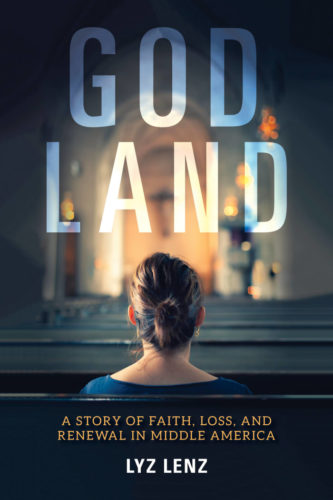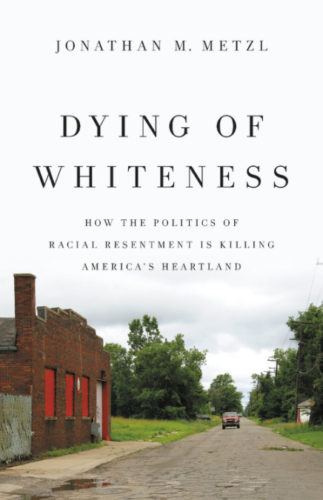Book Commentary: “Dying of Whiteness” — What Rough Beast Slouches Toward Kansas to be Born?
By Jeremy Ray Jewell
Class pressures are exerting themselves, class fault-lines are emerging, and ancient demons are being released as a result.

“To bridge this divide, you must die to yourself. Become other than yourself.” So advises Lyz Lenz in God Land (Indiana University Press) regarding how we might get beyond the current radical impasse and “bridge the divide” in Trump’s split America. Lenz attempts to confront her own psychological barriers, but she isn’t entirely successful. Her reasoning is admirable: talking with members of the white working class could be part of a moral intervention that eventually calls for power redistribution. Sit down and convince them that they are the beneficiaries of a power structure. (Although they may never see any personal benefit; in fact, they may see nothing but sacrifice.) Then convince them that it is ethically self-evident that they need to stop complaining and let others complain more. The effort to reach out sounds good, but how does it differ from what other anti-Trump factions are offering? Ironically, to sit a person down and tell them they are the beneficiaries of “whiteness” — which they have not subjectively experienced as a benefit — might drive them toward a more resolutely politicized understanding. To suggest that they are profiting from “whiteness” might end up reinforcing the precise argument white supremacists are making today.
In other words, we’re stuck in a loop. The best-intentioned liberal efforts at generating empathy end up re-enforcing difference. And that stasis leads to the exhaustion which some are feeling concerning the “bridge the divide with the heartland” shtick. Of course, this fatigue is very much rooted in privilege — the privilege of distance. We still don’t need to understand because we are still “othering” our less privileged opponents.
The best that we can do, if we are too tired to understand the white underclass, may be to confront some sober objective analysis. Psychiatrist and physician Jonathan Metzl’s Dying of Whiteness (Basic Books) prescribes science, using empirical observations and statistical analysis to deduce the ways in which policies seen as investments in “whiteness” end up doing more harm than good. So-called conservative, “back to greatness” politics are designed to make underclass whites suffer more, while funneling wealth upwards. This empirical critique has some significant limits, but it is probably the most powerful contribution that has been made so far in diagnosing our Trump-induced American malaise. For Metzl the researcher, the inability to move beyond our subjectivity isn’t the problem — wisdom lies elsewhere: “The best research respects the culture and the traditions it studies and should feel grateful to be let in.” And that’s not coming from a complete outsider. Like Lenz, Metzl is a card-carrying Midwesterner.
The fact that Metzl takes his cues from his personal background when shaping his study is significant. When he approaches the subjects of gun control in Missouri, health care in Tennessee, and education in Kansas, he draws on the geographic trajectory of his own life. He demonstrates, through interviews and analysis of public data, that lessened gun restrictions in Missouri — couched in post-Ferguson terms of self-defense and salutes to white agency — led to a sharp increase in gun-related suicide among whites. That the failure to expand Medicaid in Tennessee under the Affordable Care Act, couched in terms of its “cost” to Southern white voters, resulted in an immense (and calculable) loss of white life. That the ideological destruction of the once great Kansas public schools under Governor Brownback (our new U.S. Ambassador-at-Large for International Religious Freedom), couched in terms of failing “non-white” urban schools and “white” school choice, has produced a net loss, in life expectancy if not the quality of life. Metzl doesn’t preach; he merely culls the data gleaned from these so-called experiments, from the NRA-backed “Missouri experiment” and the health care industry-backed “Tennessee experiment” to the Koch-backed “Kansas experiment.”
 One may add to these the Art Pope-backed “North Carolina experiment” in democratic disenfranchisement, which was itself covertly sold as a way to prevent illicit nonwhite voting. Ultimately, it has disenfranchised many whites. The Wilmington insurrection of 1898 (if not the Civil War!) showed how “whiteness” can be used to set the lower classes against their best interests. The first benefits reaped by those whites were displacement, disenfranchisement, and death. The company town, the sharecropper economy. Lucrative deals were made elsewhere by the well-to-do; the prerogatives of the Republican North suddenly coincided nicely with those of the Democratic South. At time when Northern taxes subsidize Southern legislation to the detriment of the South (where a majority of African Americans still reside), only the blind will fail to see how financial gain is made on Wall Street — the profit generated by companies shifting to a well-saddled, unorganized Southern workforce. Thus, as Metzl observes, the white backlashers will follow their backlash into oblivion. In that sense, what we are seeing among the Trump supporters is the inevitably political reaction to the end of politics. Metzl senses this, referencing Saidiya Hartman and Barbara Baumgartner on their exploration of how enslaved peoples, with no real political power, used their black bodies as sites of opposition. And that suggests a shortcoming in Metzl’s analysis, which is based on a limited idea of self-interest as receiving a benefit. Suffering for a cause can become a way of asserting agency. Self-interest is about ideology as much as it is about statistics.
One may add to these the Art Pope-backed “North Carolina experiment” in democratic disenfranchisement, which was itself covertly sold as a way to prevent illicit nonwhite voting. Ultimately, it has disenfranchised many whites. The Wilmington insurrection of 1898 (if not the Civil War!) showed how “whiteness” can be used to set the lower classes against their best interests. The first benefits reaped by those whites were displacement, disenfranchisement, and death. The company town, the sharecropper economy. Lucrative deals were made elsewhere by the well-to-do; the prerogatives of the Republican North suddenly coincided nicely with those of the Democratic South. At time when Northern taxes subsidize Southern legislation to the detriment of the South (where a majority of African Americans still reside), only the blind will fail to see how financial gain is made on Wall Street — the profit generated by companies shifting to a well-saddled, unorganized Southern workforce. Thus, as Metzl observes, the white backlashers will follow their backlash into oblivion. In that sense, what we are seeing among the Trump supporters is the inevitably political reaction to the end of politics. Metzl senses this, referencing Saidiya Hartman and Barbara Baumgartner on their exploration of how enslaved peoples, with no real political power, used their black bodies as sites of opposition. And that suggests a shortcoming in Metzl’s analysis, which is based on a limited idea of self-interest as receiving a benefit. Suffering for a cause can become a way of asserting agency. Self-interest is about ideology as much as it is about statistics.
Once reactionary ideologies establish that allegiance to a dominant class via a perceived common “in-group” status will produce personal benefit (often in the form of sacrifice), there’s little internal resistance to doubling down on that expectation when that status fails to deliver. Blame for failures of outcome are credited to the machinations of other groups, which become the targets for growing frustration . . . even to the point of violence, forced labor, murder. This kind of barbarity must be combated at all costs. But will a carefully articulated argument like Metzl’s — based on self-interest — be sufficient? Perhaps the smarter course would be to let the conservative lemmings gallop toward the cliff? Philosopher Slavoj Žižek recently stated that the best response to reactionary rightist identity politics may very well be to watch it march right into its own absurdist cul-de-sac. Let the weaponized white/male/straight/cisgender/
Metzl’s empirical analysis shows us where that shift leads us. It will take us to more careful investigations of what it means to be “white.” Beyond that, it suggests that racial conflicts are being played out in the strategically minimized (by the powerful) context of class. Class pressures are exerting themselves, class fault-lines are emerging, and ancient demons are being released as a result. As Lenz is aware, subjective bridge-building is not necessarily the best response when we’re talking about the creation of would-be devils . . . or would-be victims of suicide. How to create the right kind of transformation? It takes investment. It takes commitment. It takes the promise of solidarity — on both sides. “We will get through this together”: wise words which centuries of careful social engineering have worked assiduously to eradicate. A sentiment that the screams of white supremacists (“This land is our land!”) at Metzl’s readings were meant to silence. But I think I hear them, now. Quietly, at first. I think I just said them, now. Louder. Louder . . . so we can all hear.
Jeremy Ray Jewell hails from Jacksonville, Florida. He has an MA in History of Ideas from Birkbeck College, University of London, and a BA in Philosophy from the University of Massachusetts Boston. His website is www.jeremyrayjewell.com, and he sometimes maintains a blog entitled That’s Not Southern Gothic.
Tagged: Dying of Whiteness, God Land, Jeremy Ray Jewell, Jonathan Metzl

